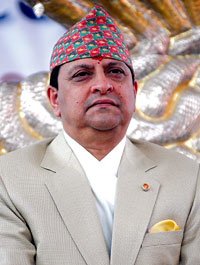 The biggest power of democracy is that the people can change a ruler who doesn't meet their expectations. The people haven't seen these expectations fulfilled after 4 October 2002 or 1 February 2005. There is not only no reason for Nepalis to be impressed by the king's performance, but they have been able to see and bear his weaknesses.
The biggest power of democracy is that the people can change a ruler who doesn't meet their expectations. The people haven't seen these expectations fulfilled after 4 October 2002 or 1 February 2005. There is not only no reason for Nepalis to be impressed by the king's performance, but they have been able to see and bear his weaknesses.
It is now no secret that the king has a very negative opinion of the political parties and their leaders. The sycophants around him have turned the king into something of a king out of Hans Christian Andersen Emperor's New Clothes, but he doesn't seem to realise it. He seems to be supremely confident about his own abilities for which there is no concrete proof. In fact, the king is being known less as the protector of the constitution and more as just a commander-in-chief of the army. His reputation inside the country is now also reflected outside. Even George W Bush spoke of King Gyanendra in the same breath as General Musharaff and the Burmese junta. By bringing the message that the king must hand power over to the political parties, Donald Camp also brought the same message. By completely ignoring the Supreme Court decision which implied that the king should only rule on advice of the council of ministers as stipulated in the constitution, the king has proved his real intentions: that he wants to keep power in his fist.
Is the monarchy the property of the king, or of the people? This debate is now widespread because King Gyanendra has shown that he is not behaving according to the spirit of the constitution. From time to time, the king has shown that he is aware of what the people are saying about him. He once told Krishna Prasad Bhattarai: "I don't want to go down in history as a person who usurped the people's rights." And he even told Sher Bahadur Deuba after reinstating him as prime minister: "I have swallowed my pride, I am now feeling lighter." And he admitted to diplomats that he may have made a mistake by ousting Deuba. But these were private comments, and besides if there is no public outcome from them it will be difficult to see it as more than just a tactical move.
All this raises the question: what is the opinion about all this of the successor to the throne, Crown Prince Paras? It is easy to guess the lifespan of the monarchy at a time of extreme polarisation between the Maoists who want to overthrow the monarchy, the political parties who have in the past supported the constitutional monarchy but are being sidelined and the public which has always regarded the monarchy as a symbol of national unity. There are people like Dr Tulsi Giri who have stepped in to demonstrate their loyalty to the king and serve as lightening rods. In a way, by being even more hardline than the king on the parties, Giri has actually made the king look like a moderate. But the people aren't going to measure the king's support for the constitution from this.
The monarch now faces the challenges of relevance and credibility. If King Gyanendra fails to see the writing on the wall, the future will be unstoppable. If he doesn't heed the aspirations of the people, he will have done injustice to them and also to the institution of the Nepali monarchy.


